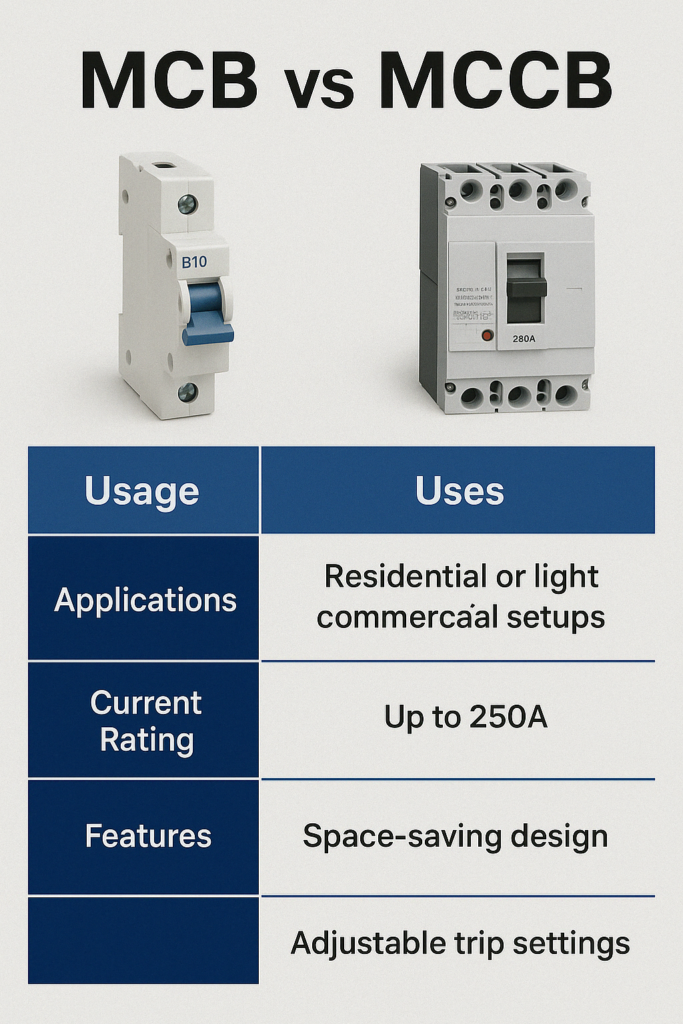
MCB vs MCCB – Quick Technical Comparison
Choosing between MCB and MCCB depends on your project’s current load, safety requirements, and environment.
MCBs are ideal for low-load residential circuits, while MCCBs handle high-load industrial systems with adjustable protection.
This side-by-side visual gives you a quick reference to understand which one fits your need — before the first wire is laid.
Need help selecting the right breaker?
Contact KS Enterprises for verified, project-ready stock and guidance.
MCB vs MCCB: What’s the Difference and When to Use Each?
Whether you’re wiring a 2BHK flat, setting up a panel in a factory, or managing electrical load distribution for a commercial space — selecting the right circuit breaker is non-negotiable. The wrong choice can lead to constant tripping, system failures, or even fire risks.
In this guide, we break down the difference between MCBs (Miniature Circuit Breakers) and MCCBs (Moulded Case Circuit Breakers) so you can make the right call based on your project type, load, and application.
What Is an MCB?
An MCB is designed for low-voltage, low-current systems. It’s the standard choice for most residential and light commercial setups.
Where MCBs Are Commonly Used:
- Home distribution boards
- Small office or shop wiring
- Interior design panels
- Individual floor circuits
Typical Ratings:
- 6A to 125A
- Available in single, double, triple, and four-pole variants
Why MCBs Are Popular:
Fast response time during overload or short circuit
Key Features:
- Up to 2,500A rating
- Adjustable trip settings
- Designed to handle higher fault levels
- Suitable for 3-phase systems
Common Use Cases:
- Industrial panels
- High-load machinery
- Building mains or generator setups
Technical Comparison: MCB vs MCCB
| Feature | MCB | MCCB |
|---|---|---|
| Current Rating | Up to 125A | Up to 2500A |
| Trip Adjustment | Fixed | Adjustable |
| Use Type | Residential, light commercial | Industrial, heavy-duty |
| Protection Against | Overload, short circuit | Overload, short circuit |
| Phase Compatibility | Single phase | Single and 3-phase |
| Cost | Low | Higher |
| Installation Size | Compact | Bulkier |
When to Use an MCB
Use an MCB when:
- You’re wiring individual rooms or floors
- Load is under 100A
- You want a compact, easy-to-install solution
- Budget is a concern but safety is still required
When to Use an MCCB
Use an MCCB when:
- You’re dealing with high-power equipment
- Loads exceed 125A
- Project demands trip setting flexibility
- Industrial certification is required
Final Word: What Should You Choose?
- For residential or interior work: MCB is the default choice.
- For commercial or industrial work: MCCB is non-negotiable.
If you’re building a panel or wiring system and don’t want to make the wrong call — KS Enterprises can help you match the right breaker for your application.
Our Role at KS Enterprises
At KS Enterprises, we source genuine branded components including MCBs and MCCBs from top industrial brands like Schneider, ABB, Siemens, L&T, and others — through verified and trusted vendor networks.
Every product we supply is project-ready, traceable, and backed by the reliability our clients depend on.
We support electrical contractors, builders, and panel fitters across Delhi NCR by helping them select the right breaker configuration for their specific application — and delivering it without delay.
We source and dispatch:
- Schneider
- ABB
- Siemens
- L&T
Final Thoughts
Choosing between MCB and MCCB isn’t just technical — it affects project timelines, system safety, and compliance. We’ve supported everyone from interior firms wiring homes to panel builders managing 500+ amp loads.
Need help selecting the right breaker for your project?
Call KS Enterprises.
We don’t just supply parts — we power the system that makes your project work.
With same-day shipping available in Delhi NCR.
Need help? Call KS Enterprises today — your circuit safety starts here.
📞 Call us: 9971720547
📧 Email: kulwantsinghenterprises@gmail.com
Let us help you choose the right protection for your next project — with zero compromise on quality or speed.
